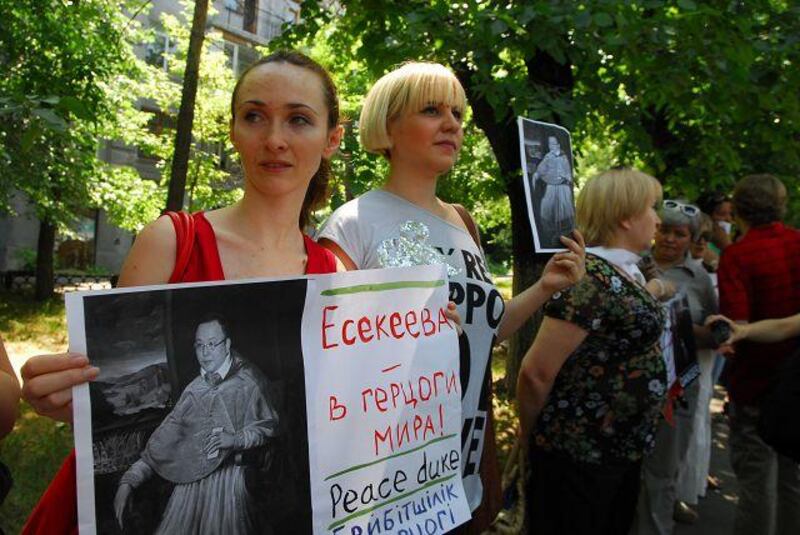ALMATY // Last October, Adil Nurmakov, a popular blogger in this Central Asian republic, started having mysterious problems accessing his account on the popular website Livejournal.com. For the computer-savvy Mr Nurmakov, it was a minor inconvenience: he simply installed software to circumvent such blockages, and now, anyone who is interested can easily follow his daily blog posts.
Easily, that is, outside of Kazakhstan. Livejournal remains inaccessible for less technically adept internet users in Kazakhstan, and a small but vocal band of bloggers in the mainly Muslim republic claim that the government is stifling online political discussion. Kazakh officials say technical problems have hindered access to Livejournal, though observers believe the government is deliberately blocking the site because of a blog by Rakhat Aliyev, the self-exiled former son-in-law of the Kazakh president, Nursultan Nazarbayev. Mr Aliyev has become a fierce critic of the iron-fisted leader and faces criminal charges in Kazakhstan.
Government pressure on Kazakh websites was stepped up this month when legislation came into force that essentially qualifies all internet resources, including blogs, chat rooms and online shopping sites, as media outlets and subjects them to criminal statutes for disseminating illegal material. Critics say the law will be selectively applied to websites that criticise Mr Nazarbayev and his government and that it is impossible for websites to filter, for example, all offensive comments that readers may leave on blogs and internet forums.
The Kazakh government has said the law is aimed at stemming the spread of child pornography and extremist materials, though Kuanyshbek Yesekeyev, head of the Kazakh Information and Communication Agency, openly told politicians this year that internet regulation is needed to prevent online organisation of mass protests like those that hit Moldova, another former Soviet republic, following presidential elections there in May.
"They never concealed that the objective is to prevent events like in Moldova or in Iran ? by effectively shutting down all resources that can broadcast alternative opinions both externally and internally," Mr Nurmakov said. The changes to the law come as Kazakhstan prepares to assume the chairmanship of the Organisation for Security and Co-operation in Europe (OSCE) next year. Kazakhstan had promised broad democratic reforms, including improvements in media freedoms, in its bid for the OSCE chairmanship.
The OSCE's representative on freedom of the media, Miklos Haraszti, urged Mr Nazarbayev in June to drop the legislation, saying it represented "a step backwards in the democratisation of Kazakhstan's media governance". "Refusing to enact this law will send a strong signal that the forthcoming OSCE chairmanship of Kazakhstan in 2010 intends to fully honour the country's OSCE media freedom commitments," Professor Haraszti said.
With the new law less than a month old, Kazakh bloggers are simply waiting to see how it will be enforced, said Yevgenia Plakhina, an Almaty-based journalist and head of the Free Internet Movement. "Everyone is waiting with bated breath," said Ms Plakhina, who helped organise a series of flash mobs this year to protest against the amendments. Most of the Kazakh blogosphere communicates in Russian rather than Kazakh - it is better developed than the Kazakh-speaking internet and most of the population speaks Russian - and only 14 per cent of Kazakhstan's 16.5 million citizens regularly use the internet, Ms Plakhina said. "But it's not necessarily the quantity that's important, but rather the quality," she said, noting that the blogosphere is a place for the educated classes to debate the direction of the country's politics.
"Now they want to make sheep out of us," Ms Plakhina said. In the meantime, Yury Mizinov said he was watching his step. Mr Mizinov, editor of the website Zonakz.net, said he was approached last year by prosecutors who were upset not about the content he published, but rather by a link he posted on his site to a video on YouTube, where a visitor had left a comment they found objectionable. "They said it was hate speech," Mr Mizinov said, though he could not remember the nature of the video or the comment. "They wanted to take it to court, but the issue was settled peacefully."
He said that since the law came into force on August 2 he had been combing the reader forums on his site to expunge material that could land him in jail. "Now any small-time bureaucrat can claim something is hate speech, whether on blogs or in forums, and our website will be closed," Mr Mizinov said. He said some of the material he is deleting includes negative comments about Mr Nazarbayev and others that could conceivably be considered hate speech, though he said a lack of manpower made it virtually impossible to catch everything.
"But we have to save the website, so these are the steps we have to take," he said. cschreck@thenational.ae





